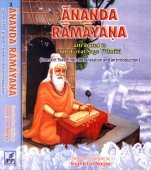Ramabhadra, Rāmabhadra, Rama-bhadra: 9 definitions
Introduction:
Ramabhadra means something in Hinduism, Sanskrit, the history of ancient India. If you want to know the exact meaning, history, etymology or English translation of this term then check out the descriptions on this page. Add your comment or reference to a book if you want to contribute to this summary article.
India history and geography
Source: Shodhganga: a concise history of Sanskrit Chanda literature (history)Rāmabhadra (रामभद्र) was the grand-father of Gokunātha Upādhyāya (C. 1650-1740 C.E.): the author of Ekāvalī and Vṛttataraṅgiṇī. Gokulanātha was the son of Pītāmbara Upādhyāya and Umā and grandson of Rāmabhadra. He was the younger brother of Trilocana and Dhanañjaya and elder brother of Jagaddhara.

The history of India traces the identification of countries, villages, towns and other regions of India, as well as mythology, zoology, royal dynasties, rulers, tribes, local festivities and traditions and regional languages. Ancient India enjoyed religious freedom and encourages the path of Dharma, a concept common to Buddhism, Hinduism, and Jainism.
Languages of India and abroad
Sanskrit dictionary
Source: DDSA: The practical Sanskrit-English dictionaryRāmabhadra (रामभद्र).—Name of Rāma, son of Daśaratha.
Derivable forms: rāmabhadraḥ (रामभद्रः).
Rāmabhadra is a Sanskrit compound consisting of the terms rāma and bhadra (भद्र). See also (synonyms): rāmacandra.
Source: Cologne Digital Sanskrit Dictionaries: Shabda-Sagara Sanskrit-English DictionaryRāmabhadra (रामभद्र).—m.
(-draḥ) The hero Ramachandra. E. rāma the same, and bhadra auspicious.
Source: Cologne Digital Sanskrit Dictionaries: Benfey Sanskrit-English DictionaryRāmabhadra (रामभद्र).—m. (auspicious Rāma), a surname of Rāma, [Uttara Rāmacarita, 2. ed. Calc., 1862.] 38, 9.
Rāmabhadra is a Sanskrit compound consisting of the terms rāma and bhadra (भद्र).
Source: Cologne Digital Sanskrit Dictionaries: Aufrecht Catalogus Catalogorum1) Rāmabhadra (रामभद्र) as mentioned in Aufrecht’s Catalogus Catalogorum:—king, patron of Mahādeva (Bṛhajjātakaprakāśa 1523). Bik. 301.
2) Rāmabhadra (रामभद्र):—king of Mithilā, son of Rūpanārāyaṇa, grandson of Harinārāyaṇa, patron of Vācaspatimiśra (Śrāddhakalpa). L. 1773.
3) Rāmabhadra (रामभद्र):—guru of Murārimiśra (Śubhakarmanirṇaya). L. 1987.
4) Rāmabhadra (रामभद्र):—father of Raghumaṇi (Āgamasāra), and of Rāmeśvara (Tantrapramoda). L. 260. 263.
5) Rāmabhadra (रामभद्र):—Dāyabhāgasiddhāntakumudacandrikā.
6) Rāmabhadra (रामभद्र):—Putrakramadīpikā.
7) Rāmabhadra (रामभद्र):—Brahmasūtravṛtti.
8) Rāmabhadra (रामभद्र):—Śṛṅgārataraṅgiṇī bhāṇa.
9) Rāmabhadra (रामभद्र):—of the Kauṇḍinya race: Śṛṅgāratilaka bhāṇa:
10) Rāmabhadra (रामभद्र):—wrote for Ṣāharāja, i. e. Shahji of Tanjore: Ṣaḍdarśanasiddhāntasaṃgraha.
11) Rāmabhadra (रामभद्र):—Siddhāntasāra [nyāya]
12) Rāmabhadra (रामभद्र):—of Navadvīpa: Vyavasthāsaṃkṣepa.
13) Rāmabhadra (रामभद्र):—son of Raghunātha. delete Udvāhavyavasthā.
14) Rāmabhadra (रामभद्र):—king of Mithilā, son of Bhairavasiṃha, son of Nṛsiṃha, son of Harasiṃha, son of Bhaveśa, son of Kāmeśa, was patron of Vardhamāna (Gaṅgākṛtyaviveka).
15) Rāmabhadra (रामभद्र):—Rāghavapāṇḍavīyaṭīkā Śleṣavirodhinī.
16) Rāmabhadra (रामभद्र):—Tantrāmṛta [tantric]
17) Rāmabhadra (रामभद्र):—Smṛtitattvavinirṇaya.
Source: Cologne Digital Sanskrit Dictionaries: Monier-Williams Sanskrit-English Dictionary1) Rāmabhadra (रामभद्र):—[=rāma-bhadra] [from rāma] m. Name of R°s Dāśarathi, [Uttararāma-carita; Kathāsaritsāgara]
2) [v.s. ...] of two kings, [Catalogue(s)]
3) [v.s. ...] of various authors and teachers (also with dīkṣita, bhaṭṭa, bhaṭṭācārya, miśra, yajvan, yati, sarasvatī, sārvabhauma etc.), [ib.]
Source: Cologne Digital Sanskrit Dictionaries: Yates Sanskrit-English DictionaryRāmabhadra (रामभद्र):—[rāma-bhadra] (draḥ) 1. m. Rāmachandra.
[Sanskrit to German]
Sanskrit, also spelled संस्कृतम् (saṃskṛtam), is an ancient language of India commonly seen as the grandmother of the Indo-European language family (even English!). Closely allied with Prakrit and Pali, Sanskrit is more exhaustive in both grammar and terms and has the most extensive collection of literature in the world, greatly surpassing its sister-languages Greek and Latin.
See also (Relevant definitions)
Partial matches: Bhadra, Rama.
Starts with: Ramabhadra bhatta, Ramabhadra bhattacarya, Ramabhadra dikshita, Ramabhadra mishra, Ramabhadra nyayalamkara, Ramabhadra sarasvati, Ramabhadra sarvabhauma, Ramabhadra sarvabhauma bhattacarya, Ramabhadra siddhantavagisha, Ramabhadra vajapeyin, Ramabhadra yajvan, Ramabhadra yati, Ramabhadradikshita, Ramabhadramba, Ramabhadrashrama, Ramabhadrastotra.
Full-text (+114): Vidvanmodini, Ramabhadramba, Ramabhadrashrama, Bhagavatacampu, Sri Ramananda Saraswati, Ramabhadra nyayalamkara, Ramabhadra sarvabhauma bhattacarya, Ramabhadra mishra, Paribhashavrittitika, Ramabhadra sarvabhauma, Ramabhadra bhattacarya, Udvahavyavastha, Nanatvavadatattva, Patanjalicarita, Raghumani, Smrititattvavinirnaya, Dayabhagasiddhantakumudacandrika, Putrakramadipika, Ramashtaprasa, Vyakhyaparimala.
Relevant text
Search found 19 books and stories containing Ramabhadra, Rāmabhadra, Rama-bhadra, Rāma-bhadra; (plurals include: Ramabhadras, Rāmabhadras, bhadras). You can also click to the full overview containing English textual excerpts. Below are direct links for the most relevant articles:
Jivanandana of Anandaraya Makhin (Study) (by G. D. Jayalakshmi)
Establishing the Authorship of Ānandarāya Makhin < [Chapter 2 - Author, His Life and Works]
Family of Ānandarāya Makhin < [Chapter 2 - Author, His Life and Works]
Life of Ānandarāya Makhin < [Chapter 2 - Author, His Life and Works]
Garga Samhita (English) (by Danavir Goswami)
Verse 8.13.5 < [Chapter 13 - A Thousand Names of Lord Balarāma]
The Padma Purana (by N.A. Deshpande)
Chapter 58 - Lakṣmaṇa Leaves Sītā in the Forest < [Section 5 - Pātāla-Khaṇḍa (Section on the Nether World)]
Chapter 73 - Rāmarakṣā Stotra < [Section 6 - Uttara-Khaṇḍa (Concluding Section)]
Chapter 254 - One Hundred and Eight Names of Rāma < [Section 6 - Uttara-Khaṇḍa (Concluding Section)]
Trishashti Shalaka Purusha Caritra (by Helen M. Johnson)
Part 10: Rāma’s life as a monk < [Chapter X - Rāma’s mokṣa (emancipation)]
Part 19: Retreat to the forest < [Chapter IV - The, birth, marriage, and retreat to the forest of Rāma and Lakṣmaṇa]
Part 1: Restoration of Pātālalaṅkā to Virādha < [Chapter VI - Bringing news of Sītā]
Sanskrit sources of Kerala history (by Suma Parappattoli)
13. Balarama-vijaya by Sitarama < [Chapter 5 - Sanskrit Dramas and Campus bearing on Kerala History]
11. Prakriyasarvasva by Melpathur Narayana Bhattathiri < [Chapter 6 - Miscellaneous Sanskrit works bearing on Kerala history]
Related products
